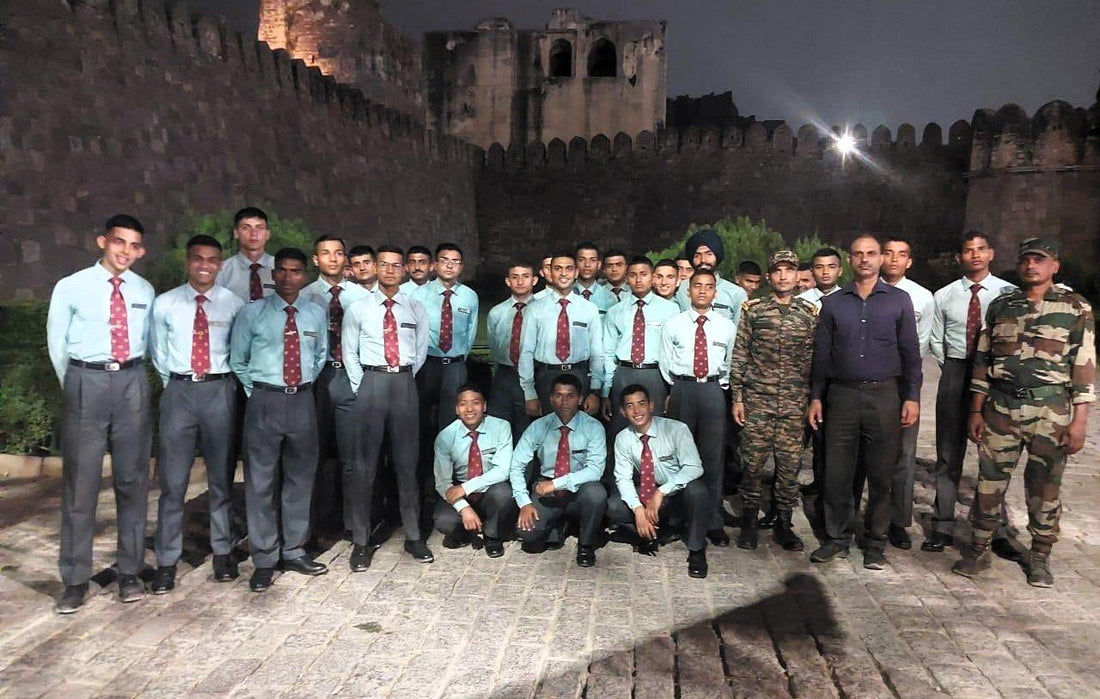Daily Routine of NDA Cadets - Life at the NDA, Training, Discipline, and Cadet Activities

The life of a cadet at the National Defence Academy (NDA) is a journey marked by vigor, discipline, and an unwavering commitment to excellence. Every aspect of their day is designed to hone their physical prowess, intellectual acuity, and leadership capabilities, crucial for aspiring officers in the Indian Armed Forces. From the crack of dawn to the moment they retire to bed, the routine is a symphony of structured activities meticulously crafted to ensure holistic development. In this article, we will delve into the daily life of NDA cadets, exploring their morning rituals, training regimens, academic pursuits, and the ethos that binds them together.
Indian Military Academy IMA Coffee Mug
Rs. 699.00
Sale price
Rs. 499.00
NDA Service Before Self Coffee Mug
Rs. 699.00
Sale price
Rs. 499.00
Officers Training Academy OTA Chennai Coffee Mug
Rs. 699.00
Sale price
Rs. 499.00
Indian Naval Academy INA Ezhimala Coffee Mug
Rs. 699.00
Sale price
Rs. 499.00
Historical Context
The National Defence Academy, established in 1954 in Khadakwasla, Pune, has a storied legacy as a premier institution for the training of future leaders in India's Armed Forces. The NDA stands unique as the first tri-service academy in the world, training cadets from the Army, Navy, and Air Force under one roof. This pioneering approach is itself a testament to the changing dynamics of warfare and military leadership influenced by collaboration and joint operations. Over the decades, the NDA has produced some of the finest officers who have gone on to serve the nation with honor and distinction.
Embracing the Morning - Reveille to Physical Training
The day for NDA cadets begins early; the reveille, or wake-up call, resonates through the campus between 4:00 AM and 5:30 AM. The specific timing may vary based on individual schedules, but the underlying principle remains the same: to instill a sense of discipline and urgency from the outset.
- Personal Hygiene and Preparation: Cadets have a short window to attend to personal hygiene and prepare for the day. This part of the routine emphasizes efficiency, setting the tone for the meticulous nature of military life.
- Physical Training (PT): Commencing around 5:00 AM, the physical training sessions last about an hour and include a combination of running, strength exercises like push-ups and sit-ups, rope climbing, and tackling obstacle courses. The intense nature of these workouts builds not only physical strength and endurance but also fosters resilience.
SSB Interview Books Power Pack: 4 Must Read Books for Defence Aspirants
Rs. 1,760.00
Sale price
Rs. 1,399.00
Let's Crack SSB Interview Book [Paperback]
Rs. 390.00
Sale price
Rs. 360.00
Breaking The Code of SSB Psychological Tests Book - SSB Interview (TAT/WAT/SRT/SD)
Rs. 390.00
Sale price
Rs. 360.00
OIR Test & PPDT Book - SSB Interview Screening Test - Stage 1 Testing
Rs. 490.00
Sale price
Rs. 375.00
The Drill - Marching Towards Perfection
Following the morning PT, cadets engage in drill practices focused on developing their marching skills and parade techniques. These sessions refine their coordination, discipline, and ability to work as a cohesive unit.
- Building Team Spirit: The emphasis on marching in unison is more than just a routine; it lays the foundation for teamwork and camaraderie. As cadets learn to synchronize their movements, they also cultivate a sense of belonging and shared purpose.
- Endurance and Agility: This rigorous drill routine helps cadets develop agility and a robust physique, essential traits for anyone aspiring to serve in the armed forces.
Academic Pursuits - Lessons Beyond the Battlefield
After the physical exertion of the morning, cadets refocus their energies towards academic classes, which stretch from 8:00 AM to 1:00 PM. Subjects range from military history and strategy to science and service-specific training.
- Diverse Curriculum: The NDA's curriculum is extensive, covering various fields designed to prepare cadets for the complexities of military decision-making. Class periods are interspersed with breaks, allowing cadets to recharge mentally.
- Cultivating Leaders: This academic emphasis aims to forge critical thinkers equipped with the skills to tackle tactical challenges. The curriculum also encourages effective communication, analytical skills, and ethical decision-making—essential attributes for future leaders in the armed forces.
Fellowship Over Meals - Lunch and Camaraderie
Lunch typically occurs between 1:00 PM to 2:30 PM. This mealtime is one of the few instances during the day when cadets can relax and bond with peers while enjoying a nutritious meal.
- Strengthening Bonds: The mess hall becomes a hub of interaction where friendships are solidified over shared experiences, and camaraderie is built.
- Health and Nutrition: The meals provided are balanced to meet the nutritional demands of rigorous training and academic pursuits, fueling the cadets for the challenges ahead.
Afternoon Engagements - Sports and Extracurriculars
The afternoon, from around 3:00 PM to 6:00 PM, is allocated to sports and various extracurricular activities. This period is crucial for physical conditioning, fostering sportsmanship, and developing leadership skills outside the classroom.
- Sporting Activities: Cadets engage in a variety of sports such as football, basketball, hockey, and volleyball. These activities enhance their physical capabilities while instilling a spirit of competition and teamwork.
- Building Character: Participation in sports offers cadets invaluable life lessons, including resilience in defeat and humility in victory, essential for any future leader.
Evening Routines - Study and Reflection
As daylight wanes, cadets return to their quarters for personal hygiene and room organization, ensuring their living spaces reflect the standards expected of military personnel.
- Study Period: Scheduled from 6:30 PM to 8:00 PM, this study block is a dedicated time for academic review, exam preparation, and seeking clarification from instructors. The importance of self-discipline during this period cannot be understated, as it is crucial for academic success.
Nightly Closures - Dinner and Lights Out
Dinner is generally from 8:30 PM to 8:50 PM and often presents a fast-paced dining experience, as cadets are encouraged to eat in a timely manner.
- Final Bonds of the Day: Similar to lunchtime, this setting provides opportunities for informal interactions, reinforcing networks of friendships carved throughout the day.
- Lights Out: The day concludes with "lights out" typically scheduled between 10:00 PM and 10:30 PM. The end of the day signifies the culmination of their disciplined efforts and a restorative pause before another rigorous day.
9 Para SF Special Forces Wall Flag
Rs. 999.00
Sale price
Rs. 699.00
OTA Chennai Wall Flag
Rs. 999.00
Sale price
Rs. 699.00
National Security Guard NSG Wall Flag
Rs. 999.00
Sale price
Rs. 699.00
Indian Military Academy IMA Wall Flag
Rs. 999.00
Sale price
Rs. 699.00
Discipline as a Cornerstone
Discipline is at the heart of life at the NDA. Cadets are expected to maintain impeccable standards not just in their personal conduct but also in military bearing at all times. Any deviation from established norms prompts swift disciplinary action, ensuring that the values of accountability and integrity are deeply ingrained.
Traditions and Extracurricular Activities
Beyond the structured daily routine, cadets engage in a variety of additional activities that enrich their life at the NDA.
- Clubs and Cultural Events: These include indoor club activities, outdoor adventures, and cultural showcases that allow cadets to express their creativity and develop skills beyond military training.
- Passing Out Parade: One of the most significant traditions is the Passing Out Parade, symbolizing the culmination of extensive training and transformation undergone during their time at the NDA. This event is not just a showcase of military prowess but also an emotional milestone for cadets and their families.
Balancing the Routine - Time Management and Resilience
The structured daily routine at the NDA instills critical life skills, including time management and resilience. Balancing the demands of physical training, academics, and extracurricular engagements teaches cadets to prioritize effectively and manage multiple responsibilities, essential attributes for future leaders.
Challenges and Solutions
However, the demanding environment is not without challenges.
- Physical and Mental Strain: The rigors of cadet life can take a toll physically and mentally. To address this, the NDA conducts regular seminars on stress management, mental health awareness, and physical fitness.
- Adaptation to Military Life: For many cadets, the transition from civilian life to military discipline can be jarring. Support systems such as peer mentoring and psychological counseling are vital in ensuring a smooth transition.
Future Trends and Predictions
As military strategies evolve, so too does the training at institutions like the NDA. The use of technology and simulation-based training is expected to rise, offering cadets an immersive learning environment that reflects modern warfare’s digital landscape.
- Integration of Technology: Cadets may see increased use of artificial intelligence and analytics to enhance their strategic thinking and decision-making capabilities.
- Focus on Mental Agility: As warfare becomes more complex and unpredictable, future training may place greater emphasis on mental agility, fostering adaptive thinking to navigate non-linear challenges.
Conclusion
The daily routine at the National Defence Academy is more than just a schedule; it is a blueprint for developing tomorrow's leaders in the Indian Armed Forces. By balancing physical training, academic pursuit, and personal development within a framework of strict discipline and camaraderie, cadets emerge not just as soldiers but as well-rounded individuals ready to serve their nation. This well-rounded approach is essential, especially as the modern military landscape requires not only physical robustness but also strategic acumen and ethical decision-making. The rigorous yet enriching journey at the NDA prepares cadets to embody the values of honor, duty, and integrity, making them resilient and capable leaders ready to face the challenges of tomorrow’s world. As they march towards their future, the experiences and skills cultivated during their time at the NDA will undoubtedly serve them and the nation for years to come.










![Let's Crack SSB Interview Book [Paperback]](http://shop.ssbcrack.com/cdn/shop/files/ssb-books.webp?v=1736351621&width=533)




















